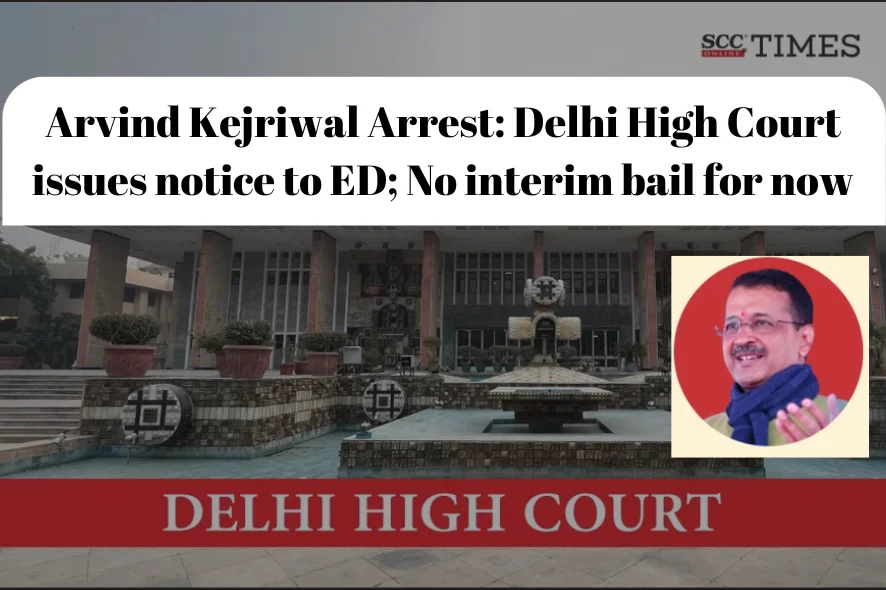Delhi High Court: A petition was filed by Arvind Kejriwal (petitioner) seeking to declare his arrest at the hands of Enforcement Directorate (respondent) to be wholly non-est, illegal, arbitrary and unconstitutional and consequently set aside and quash the entire proceedings relating thereto including arrest order dated 21-03-2024 as a gross and blatant abuse of the process of law as well as perversion of power and authority, infringing the petitioner’s fundamental rights as guaranteed under articles 14, 19, 21 and 22(1) & (2). Swarana Kanta Sharma, J., held that any order passed in the application for interim release of petitioner, pending disposal of the main petition without calling for reply of the respondent, at this stage, would rather amount to deciding the main petition itself.
The Court further issued notice to ED on the main writ petition and the application for grant of interim relief, returnable on 03-04-2024.
The petitioner sought relief regarding his arrest and subsequent remand by the Directorate of Enforcement. The petitioner’s arrest was made in connection with a case registered under the Prevention of Money Laundering Act (PMLA). The petitioner contended that his arrest was a gross abuse of power and violated his fundamental rights as guaranteed under Articles 14, 19, 21, and 22(1) & (2) of the Constitution of India. Additionally, the petitioner argued that the remand order passed by the Special Judge (PMLA) was routine and mechanical, lacking any substantial grounds.
However, Additional Solicitor General representing the Directorate of Enforcement contended that the respondent had the right to file a reply and be heard before any order was passed. He emphasized the importance of allowing respondent an opportunity to present their case.
The Court noted the gravity of the issues raised in the petition, including questions regarding the legality of the arrest, potential political motivations, and implications for fundamental rights and democratic processes. The Court recognized the need for a fair hearing and adherence to the principles of natural justice, including the right to be heard.
The Court remarked that “the present petition raises several issues of legality and validity regarding the arrest and remand of the petitioner. Additionally, it questions whether the arrest may be politically motivated and malafide. There are also serious concerns which have been raised by Sh. Singhvi, Senior Counsel on behalf of the petitioner, which relate to Article 21 of the Constitution of India and Section 19 of PMLA, as well as the validity of the statement of an approver. The necessity and timing of the arrest of the petitioner and the motive behind it has also been argued at length by the Senior Counsel, Sh. Singhvi. He has also raised serious and critical questions before this Court that this Court being a constitutional Court must apply its mind to the motive behind the arrest which is patently illegal and has a direct bearing on the democratic process of impending elections in the country. “
The Court further remarked that “…such important questions and issues cannot be summarily heard and decided, by giving opportunity to only one party to file petition, documents, short note of arguments and compilation of judgments relied upon by them, especially when copy of the petition was provided to the Directorate of Enforcement yesterday itself, and the short note of arguments and compilation of judgments relied upon by them were provided to the Court as well as the learned ASG during the hearing itself. It will be unfair to not give an opportunity to the Directorate of Enforcement to rebut the same by way of filing of a detailed response.”
The Court observed that the relief sought in the petition and the application for interim relief were essentially the same, depending on the main petition’s outcome. It acknowledged that deciding on the interim relief would effectively dispose of the main petition.
The Court held that both parties should be given an opportunity to present their arguments and evidence. It rejected the petitioner’s contention that no reply was required from the respondent, emphasizing the importance of fair representation and the principles of natural justice.
The Court directed the Directorate of Enforcement to file replies to both the main petition and the application for interim relief till final disposal on 03-04-2024.
[Arvind Kejriwal v Enforcement Directorate, W.P.(CRL) 985 of 2024, decided on 27-03-2024]
Advocates who appeared in this case :
Senior Advocate Abhishek Manu Singhvi








